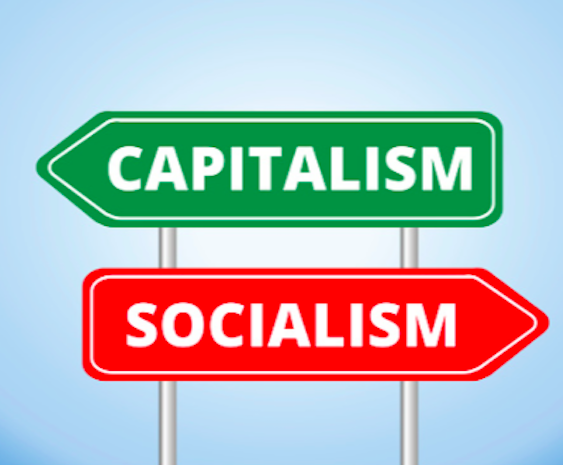There’s been an awful lot of scribble and chatter lately about a recent Gallup survey purporting to show that America, Democrats especially, are becoming more enamored of socialism. Most of the people who’ve had something to say about it though have gotten it wrong. Democrats are not moving to the left in any appreciable way. They’re just moving further away from the center.
Let’s spend a moment discussing why that’s a distinction with a difference. Gallup first asked whether survey participants had a more favorable view of socialism or capitalism in 2010. The results on the GOP side have been consistent throughout, with about three-quarters of Republicans regularly indicating more positive feelings about the free market. Among Democrats, however, there’s been a shift.
Here’s how the polling firm describes it: “For the first time in Gallup’s measurement over the past decade, Democrats have a more positive image of socialism than they do of capitalism. Attitudes toward socialism among Democrats have not changed materially since 2010, with 57% today having a positive view. The major change among Democrats has been a less upbeat attitude toward capitalism, dropping to 47% positive this year—lower than in any of the three previous measures.”
To put it differently, and in a way more relevant to the current political climate, Democrats are losing faith in capitalism, not growing more attached to socialism. That matters because of the consequences for both parties.
From the beginning of the industrial revolution to the onset of the New Deal, socialism thrived as a viable thread in the national politics and as a leading cause of reform. Then the movement was subsumed into the Democratic Party as part of FDR’s grand coalition and has remained there ever since. What’s pushing it back out onto its own is not so much the rise of Sanders as it is the failures of Obama.
Some may say that’s beating a dead horse. The reality is far different and was well-expressed by outgoing House Speaker Paul Ryan, R-Wisc., at the 2012 Republican National Convention, the night he was nominated to run for vice president.
In his speech he talked of millennials living in their parents’ basements, staring at fading political posters promising things like “Hope” and “Change” while wondering when they were ever going to get a job. Saddled with student loans that they’d only taken out in the belief they’d soon be swimming in money, thanks to an entry-level position on Wall Street or in Silicon Valley, they were taken in by a culture that fawned over conspicuous consumption that, in the end, didn’t deliver.
It’s no surprise they ended up disappointed. The elite schools that had provided them with impressive diplomas did little to prepare them for life in the real world. Instead they set out on their journey through life with heads full of mush and ended up sleeping in public parks outside corporate headquarters to protest income inequality.
If the whole experience taught them anything it was that getting things you wanted or needed, like health care and a college education, would be so much better if they were free. Or at least if someone else was paying the bills. Which, when you boil it down, is one of the things most wrong with socialism. As Margaret Thatcher once said, “sooner or later you run out of other people’s money.” Just look at Venezuela.
For conservatives who support the free market—a much-improved way to describe capitalism—the trend identified in this latest Gallup survey provides both an opportunity and a warning. Ever since Ronald Reagan left the White House they’ve been busy searching for “kinder, gentler” ways to talk about the economic realities of the world. It’s a fool’s errand. The so-called reformocons who think public policy measures need to be marketed in ways appealing to those who have a favorable view of socialism, Ryan included, have missed the mark. As Donald Trump proved in 2016, that’s not the way to win votes in Michigan, Pennsylvania and other states that used to be part of the nation’s manufacturing heartland.
Blunt, straightforward talk about how free markets make life better, how the interaction of willing seller and motivated buyer produce results favorable to both sides—like Reagan did throughout his career, first for General Electric and then in the political arena—is a winning message. It’s the only way to push back against the crisis of capitalism. And if voters in Michigan and Pennsylvania and the rest of the heartland follow, it won’t matter much what the editorial board of The New York Times thinks, which would be progress.
